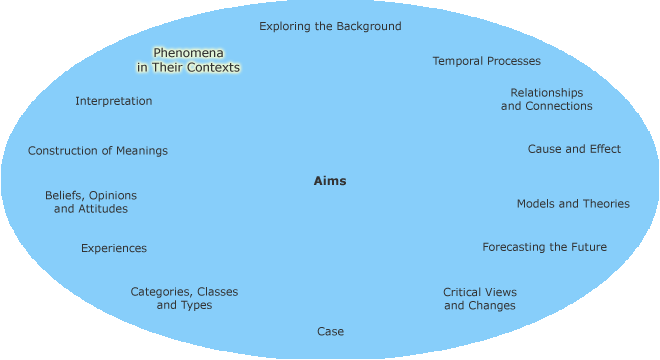Phenomena in their contexts

phenomenon often refers to an extraordinary event or happening.
cience refers to a phenomenon as any event that is observable either to the eye or through the use of instruments.
through their mind.
In humanistic research aims, the starting point is the environment, in which the effects of the phenomenon are perceived or, which has produced the phenomenon. The aim of the research may focus on the description of the physical and social environment related to the phenomenon and the analysis of their effects on the phenomenon. In addition, the aim of the research may focus on the description of the interaction, communication and culture related to the phenomenon, and the analysis of their effects on the phenomenon.
The research of the phenomenon may be conducted either from the point of view of the community who produced the phenomenon or from the point of view of an outsider. In both cases, the research is based on the idea that exploring the physical and social environment of the phenomenon produces deep knowledge of the phenomenon and its effects on society.
Strategies
Research aiming to analyse the phenomenon in its own by exploring concrete materials such as documents, interviews, images or objects can be defined as empirical research. Qualitative research is the norm.
A case study enables you to research a phenomenon in its by focusing either on a particular or small group of research objects. Longitudinal research enables you to explore a phenomenon in its over a long period of time. enables you to explore the
Data Collection
can use different types of data collected by a variety of methods. You can use either data collected for previous research by another researcher (existing concrete materials) or collect / produce your own data during the research process. The norm is to use self-produced data.
You can use a variety of research strategies: Population research is suitable when the quantity of available data on a phenomenon is small. Sampling is suitable when the quantity of available data on a phenomenon is too large for you to analyse all of it. Random sampling enables you to select a small element without bias. Purposive sampling (goal-directed sampling) enables you to select samples that match the aim of the study.
Ethnographic research uses purposive sampling of materials not a random sample of materials. The various modes of observations and interviews are the typical data collection methods in ethnographic research.
Data Analysis
Qualitative analysis methods are suitable for research aiming to analyze the meanings of the phenomena in its environment and the interaction of the phenomenon and its contexts. Qualitative analysis methods suitable for this type of research are:
Ethnographic analysis is based on hermeneutic analysis.
Ethnographic analysis is based on close reading.
Discipline-specific analysis methods
Philosophies in Science
Qualitative analysis methods in the humanities are based on interpretivism. Views emphasising interpretation in the formation of meanings and subjectivity in meaning-making processes, obey the idea of relativism.
Ethnographic research uses various hermeneutic analyses.
Close reading methods are often based on hermeneutics.
Constructivism, in which the meanings of phenomena are seen to be constructed (only) in their environment and within their contexts can be the basis of analyses explaining the meanings and interactions of phenomena and their environments.
